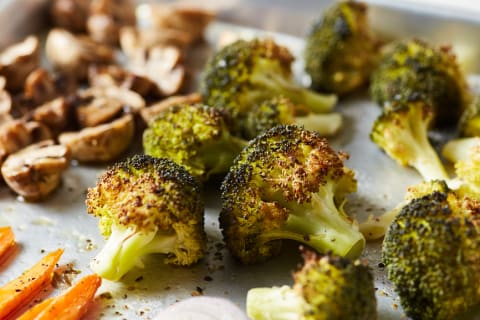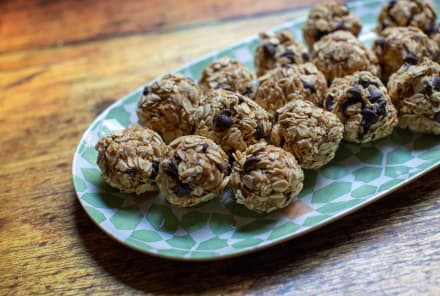Advertisement

Are you among the many women experiencing hormonal imbalances? Do you have sore breasts, extreme mood swings, water retention, or fatigue before your periods? Do you have killer cramps that are robbing you of precious days of your life? In my time directing a endometriosis clinic and authoring books on thyroid health, I've found that what you eat not only makes a difference in your overall health but can also have a dramatic impact on your reproductive hormones. Below is a list of foods you should limit or avoid and foods that will strengthen your body and improve hormone balance.
Foods to Include
1. Fermented foods (such as miso, fermented vegetables, tempeh, and sauerkraut)
Inside our digestive tracts lives a complex community of microorganisms that play an important role in hormone balance. Fermented foods provide a rich source of beneficial bacteria for your gut. Eating a diet high in fiber will feed these health-enhancing organisms.

2. Green Tea
Drinking green tea has been shown to reduce estrogen production. Consider a cup of green tea as your morning beverage.
3. Fish
Fish is a great source of omega-3 fatty acids. This type of fat can reduce inflammation, balance hormone levels, and improve fertility. Try adding wild salmon or sardines to your diet a few days a week to increase your omega-3 intake.
4. Cruciferous Vegetables
Vegetables such as broccoli, cauliflower, arugula, radishes, Brussels sprouts, and kale contain glucosinolates, which aid in healthy estrogen metabolism.

5. Flaxseed and Lignans
Flaxseed and lignans (found in flaxseed, sesame seeds, berries, and other foods) contain phytoestrogens that lower estrogen levels and shifts estrogen metabolism to healthier metabolites. Try adding some freshly ground flaxseed powder to your morning meal.
6. Protein
Consuming adequate protein each day is important for estrogen metabolism and overall health. Aim for a goal of one gram per kilogram of body weight each day. For example, a 3-ounce piece of salmon contains approximately 20 grams of protein, and one cup of beans provides fifteen grams.
7. Rosemary
This potent herb improves liver function and promotes detoxification of estrogen. Add a sprig of rosemary to your next dish.

8. Mushrooms (all varieties)
Adding mushrooms to your diet can help reduce estrogen production. Try sautéing some mushrooms and adding them to your next meal.
9. Fruits and Vegetables
Vegetables are a rich source of nutrients such as folate, methionine, and vitamin B6. In addition, fruits and vegetables are teeming with phytonutrients (protective chemicals found in plants), antioxidants, and fiber, all of which are essential for maintaining healthy hormone levels. Fruits do contain a high source of natural sugars; therefore, I recommend limiting your fruit consumption to no more than two servings per day. In order to avoid hormone disrupting pesticides, choose organic whenever possible.
Foods to Limit or Avoid
1. Trans-Fatty Acids
The cell membranes of our reproductive hormones contain fat. A cell membrane made up of trans-fatty acids disrupts cellular communication and has been shown to increase fertility struggles. Avoiding fried foods and foods that have the words trans-fatty acids, hydrogenated, partially hydrogenated, HVO, or shortening listed in their ingredients will help you avoid this dangerous fat.
2. Sugar and Overconsumption of Carbohydrates
Research has demonstrated that a diet high in added sugars and excess carbohydrates increases estrogen and testosterone levels. Sugar is added to almost every packaged food. It's important to look at the ingredients on food labels for any form of sugar. Limit your carbohydrates to no more than thirty grams per meal.

3. Dairy and Meat
Consumption of dairy and meat can be a source of toxins including hormones, antibiotics, and environmental carcinogens such as dioxins. I am not an advocate for avoidance of meats and dairy, as they contain many essential nutrients, but rather recommend making safer, healthier choices. Choosing meats that have been grass-fed, antibiotic-free, hormone-free, and humanely raised and consuming organic dairy products in moderation will greatly reduce toxin exposure.
4. Food Sensitivities, Allergies, and Intolerances
Eating foods that trigger an immune response can have a negative effect on hormone health. The immune system and the hormone system are tightly connected, and when one is altered, the other can be affected. In addition, the body increases cortisol production when exposed to foods that elicit an immune response. Elevated cortisol will alter sex hormone levels. The most common food sensitivities are gluten, wheat, eggs, dairy, soy, corn, red meat, chocolate, and nuts and seeds. An elimination diet can be helpful for discovering food sensitivities.
5. Caffeine and Caffeine-Containing Beverages
Ingestion of caffeine (especially excessive amounts) has been demonstrated to increase circulating estrogen.

6. Alcohol
Even moderate consumption of alcohol has been shown to increase the amount of estrogen and may decrease progesterone levels in women. Limiting or complete avoidance of alcohol may be helpful for a healthy hormone balance.
You have a lot of power in your fork to influence your health. Food can be a poison or a medicine in the body. Choose wisely, and you will start your journey to better overall health and harmonious hormones.
Watch Next
Enjoy some of our favorite clips from classes
Enjoy some of our favorite clips from classes
What Is Meditation?
Mindfulness/Spirituality | Light Watkins
Box Breathing
Mindfulness/Spirituality | Gwen Dittmar
What Breathwork Can Address
Mindfulness/Spirituality | Gwen Dittmar
The 8 Limbs of Yoga - What is Asana?
Yoga | Caley Alyssa
Two Standing Postures to Open Up Tight Hips
Yoga | Caley Alyssa
How Plants Can Optimize Athletic Performance
Nutrition | Rich Roll
What to Eat Before a Workout
Nutrition | Rich Roll
How Ayurveda Helps Us Navigate Modern Life
Nutrition | Sahara Rose
Messages About Love & Relationships
Love & Relationships | Esther Perel
Love Languages
Love & Relationships | Esther Perel












